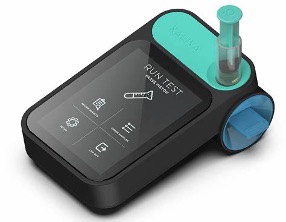POC Saliva Testing Device Predicts Heart Failure in 15 Minutes
August 22, 2024
Source: drugdu
 312
312

Heart failure is a serious condition where the heart muscle is unable to pump sufficient oxygen-rich blood throughout the body. It ranks as a major cause of death globally and is particularly fatal for individuals without access to medical facilities. Traditionally, heart failure is monitored biannually through a blood test that measures B-type natriuretic peptide (BNP) levels, indicating excessive heart strain. Recently, advancements in point-of-care technology aim to revolutionize this approach by introducing simple, at-home saliva tests, allowing frequent monitoring of heart health more regularly than the current every six-month blood test. Until now, the widespread application of portable saliva tests has been hampered by complex production processes and the limited scope of data they can provide, usually restricted to a single biomarker.
Now, a team of researchers at Colorado State University (Fort Collins, CO, USA) aims to bring heart failure screening from clinical settings to the home. The team has developed a point-of-care electrochemical biosensor that works similarly to lateral flow tests like those used for COVID-19 but is designed for heart failure detection. This biosensor can analyze two heart failure biomarkers from a drop of saliva in about 15 minutes. Dubbed the electrochemical capillary-driven immunoassay (eCaDI), this device integrates innovations from their previous work—a microfluidic saliva device and a biosensor that detects biomarker proteins Galectin-3 and S100A7.
The eCaDI system consists of five layers arranged like a club sandwich. It includes three layers of transparent, flexible plastic separated by double-sided adhesive. The top plastic layer features small holes for saliva input, and the middle layer contains laser-cut channels that lead to blotting paper, which draws the saliva through these channels. Embedded between the plastic layers are glass fiber pads infused with reagents that react with the saliva, measuring the levels of Galectin-3 and S100A7 upon the application of an electrical current. The bottom plastic layer is equipped with carbon ink electrodes, printed to interact with the reagents. These electrodes are connected to a potentiostat, an external device that supplies the necessary electrical current to trigger the reactions on the reagent pads.
This single-use eCaDI costs approximately USD 3 per unit, with the potentiostat, a small, reusable power supply, priced around USD 20. In trials, the device was tested with standardized human saliva spiked with biomarker levels indicative of heart failure, where it successfully detected the concentrations of Galectin-3 and S100A7. Moving forward, the researchers plan to initiate human subject trials to validate the efficacy of eCaDI in both healthy individuals and patients diagnosed with heart failure.
“Our device would be ideal for people who are at high risk for heart failure but have limited access to a hospital or a centralized lab,” said Trey Pittman, a graduate student at Colorado State University. “These demos are a first step towards a robust and non-invasive electrochemical sensor for heart failure biomarkers. This work may provide a starting point for new saliva testing platforms for other diseases.”
Source:
https://www.labmedica.com/microbiology/articles/294802214/rapid-diagnostic-system-to-deliver-same-shift-antibiotic-susceptibility-test-results.html
Read more on
- The first subject has been dosed in the Phase I clinical trial of Yuandong Bio’s EP-0210 monoclonal antibody injection. February 10, 2026
- Clinical trial of recombinant herpes zoster ZFA01 adjuvant vaccine (CHO cells) approved February 10, 2026
- Heyu Pharmaceuticals’ FGFR4 inhibitor ipagoglottinib has received Fast Track designation from the FDA for the treatment of advanced HCC patients with FGF19 overexpression who have been treated with ICIs and mTKIs. February 10, 2026
- Sanofi’s “Rilzabrutinib” has been recognized as a Breakthrough Therapy in the United States and an Orphan Drug in Japan, and has applied for marketing approval in China. February 10, 2026
- Domestically developed blockbuster ADC approved for new indication February 10, 2026
your submission has already been received.
OK
Subscribe
Please enter a valid Email address!
Submit
The most relevant industry news & insight will be sent to you every two weeks.



